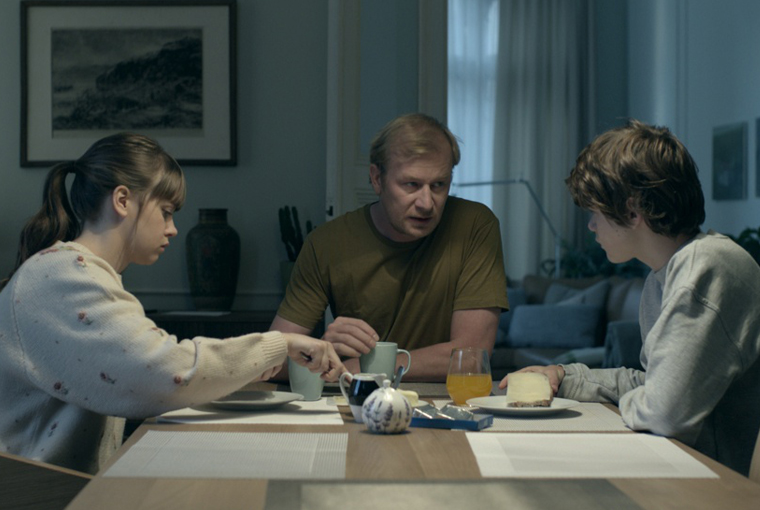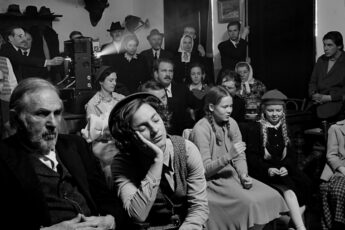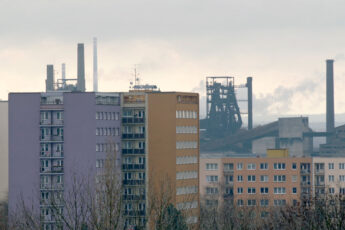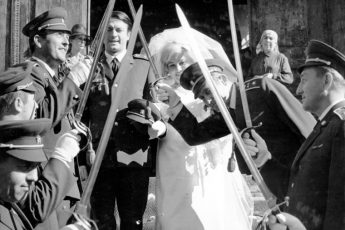Observations of a Family and their Dog
Olmo Omerzu’s Family Film (Rodinný film, 2015)
Vol. 74 (April 2017) by Rohan Crickmar
Omerzu and his co-writer Nebojsa Pop Tasic are comic writers masquerading as melodramatists. So sly and sharp is their humour that at first glance Family Film can seem like just another faintly surreal piece of Czech whimsy. However, probing deeper into the deliberately flat and distancing formalism of Lukas Milota’s cinematography it becomes increasingly apparent that this Slovenian filmmaker is a minor master of caustic subversiveness.
Everything of importance to the structure of the film is actually introduced in the very first sequence, one of the few moments in the film when the eponymous family are all together in one space, including Otto their beloved Border Collie. The parents, Irena (Vanda Hybnerova) and Igor (Karel Roden, for once not playing Mr. Nasty), are going away on a lengthy Indian Ocean yachting holiday. Their two teenaged children are going to be left home alone in the family’s spacious and uber-modern city center Prague flat. Anna (Jenovefa Bokova) is the older sibling, but she is viewed as slightly less responsible than her younger brother Erik (Daniel Kadlec), especially by their father who doesn’t even attempt to hide his favoritism. Yet it is Anna who turns out to be the figure who ultimately holds the family together when an accident at sea and a serious illness put the integrity of the family in serious doubt.
The presence of video panels in the headrests of the front car seats within the opening sequence gives us a very clear indication of the social standing of this family. On these screens a wildlife film is describing the mating rituals and family structures of frogs, drawing attention to the mirroring of the human and animal worlds, which becomes ever more prominent as the film progresses. The frog becomes a key motif that runs through the film, and the frog’s mating ritual is curiously echoed in a key plot twist late in the film. Erik’s intimacy with Otto is also established in these early moments, and throughout the film Erik and Otto’s experiences are drawn together over the vast distances separating them, as if Erik were inhabiting his pet dog’s life within a dream state.
Unlike in various US comedies where teenage kids are left to their own devices by selfish and self-absorbed parents, Omerzu and Tasic write the relationship between parents and children as one of mutual respect and varying degrees of irresponsibility. These are bourgeois parents revelling in the liberal freedoms denied to their own parents. As Igor says to Erik “when I was young I never imagined my parents taking off somewhere”. This serves as a justification for Igor and Irena’s own reckless irresponsibility, as well as a tacit affirmation of the trust that Igor is placing in his son to behave responsibly in their absence. The history of state Socialist repressions in the former-Czechoslovakia play out in the space between parental generations. Igor and Irena have possibilities their parents did not, and this in turn reshapes their mode of parenting.
The film has a near-anthropological approach in its aesthetics, using the film frame as a means of coolly demarcating an objective field of study. Part of this is to do with Milota’s clinical cinematography, but it is also significantly dictated by Jana Vickova’s use of an editing strategy that is pregnant with ellipses. Passages of time skip by in a way that both suggests a detached disinterest in narrative, and simultaneously a disorienting urgency in the melodramatic moment (a tension that only intensifies as the film reaches its conclusion). It is possible to draw comparisons with the more anarchic comic posturing of Steve Oram’s 2015 directorial debut Aaaaaaaah! as both films have keenly approximated the look and approach of a wildlife documentary, but for the purposes of a satirical anthropological study.
A safeguard on possible societal accusations of negligence (which actually emerge when Erik begins to cut classes, forcing his teachers to Skype his parents) comes in the form of Igor’s bachelor brother Martin (played by Omerzu stalwart Martin Pechlat). Martin is a nice, well-meaning and reliable figure who is only meant to step in if the children are veering of the rails. Erik’s declining school performance forces Martin to encroach upon the communal atmosphere that Anna and Erik have established within the family apartment. Anna’s friend Kristyna (Elisa Krenkova in a remarkable performance of playful promiscuity and sensuality) effectively moves in with the siblings, as does a friend of Erik’s. Kristyna is the catalyst for melodramatic action in the film, proving both sexually provocative and teasingly seductive. It is Kristyna’s sexual manipulations of the guileless Erik that drives a first clear wedge between brother and sister. This division is later reinforced by Martin’s inadvertent favoring of Anna’s responsible behavior over Erik’s waywardness. With Martin inserted into the domestic sphere Omerzu and Tasic begin to skirt around some very dangerous and transgressive material, that is only really possible thanks to the formal structures they’ve assiduously deployed. Moments like that which shows Martin sleeping on the living room couch, with Anna on one side of him and Kristyna on the other, hint at the possibility of Martin taking advantage of his position of authority in this peculiar extended family. Likewise, the close matching of shots in which Erik is shown to be in lying in bed first with Kristyna and then with his sister Anna, turn the pained innocence of this latter scenario in to one loaded with the dangerous sexual energies of the former.
It is worth considering how the film focuses a significant degree of its dramatic/comic action around Erik. His sexual awakening at the insistent instigation of Kristyna takes up a large part of the middle of the film and provides possibly some of the most tenderly handled elements of an otherwise rather emotionally aloof film. Also, as has been mentioned earlier, there is a clear visual affinity between Erik and Otto, that makes the lengthy passages spent on the desert island with the family’s marooned pet read like an exercise in empathy between wounded animals (Erik falls seriously ill in the latter stages of the film, just as Otto suffers a series of calamitous events on the island). When the film ascends to its shrillest pitches of melodrama Erik is an integral part of these narrative exigencies, casting a particular pall over Igor’s role as father. What should seem like a ridiculous excess of narrative contrivance actually plays out like a mordant examination of irresponsibility and bourgeois ennui. Early in the film Kristyna, having engaged in a provocative game of descending nude in the elevators of the apartment block, is asked by Erik why she plays this game. Her response is a bald diagnosis of the family’s barely suppressed neurosis of affluence, “Nobody wants to be bored”.
Family Film is a tonally assured expansion of the devious comedy present in Omerzu’s 2012 feature debut Prilis mlada noc. As in that film, not only does the Slovenian filmmaker show a deft facility with the comic and the satirical, but he is also able to create uneasy tension and interest in the most unlikely of scenarios. Otto’s travails upon his desert island (a mark of the material ambition of this film being its use of Thailand as a shooting location) are as dramatically engaging as anything presented from the human perspectives within the drama. Another real strength of this director appears to be the way he is able to get his actors to convey a series of conflicting desires discretely but effectively. A standout sequence in this regard involves Martin’s attempt at filling both parental roles, whilst simultaneously opening up his bachelor life for the unforgiving scrutiny of his young charges. The surreal twist in this sequence coming in the form of a cultural artifact that simply baffles Anna, Erik and Kristyna. The director also shows a rather masterful ability when it comes to the pop song selections for his soundtrack. Mica Levi’s noise-pop act Micachu & the Shapes provides an excellent soundtrack choice for a moment of intense sexual confusion. Whilst the film closes with the Man Man track ‘Life Fantastic’ which neatly distills the essence of the film’s narrative flights of fancy.
Omerzu is not the only Slovenian-born filmmaker to have found a degree of film success in an adopted nation elsewhere in the former Eastern Bloc. One of Polish cinema’s most successful films of recent years, the bittersweet romantic comedy Listy do M. (2011) was directed by a Slovenian émigré called Mitja Okorn. Is this just coincidence, or does it suggest that Slovenian filmmakers have to go elsewhere to escape the limitations of a rather small domestic film industry? Whatever the answer to this might be, both the Czech and Polish film industries are better off for having such assured comic stylists in their midst.




Leave a Comment